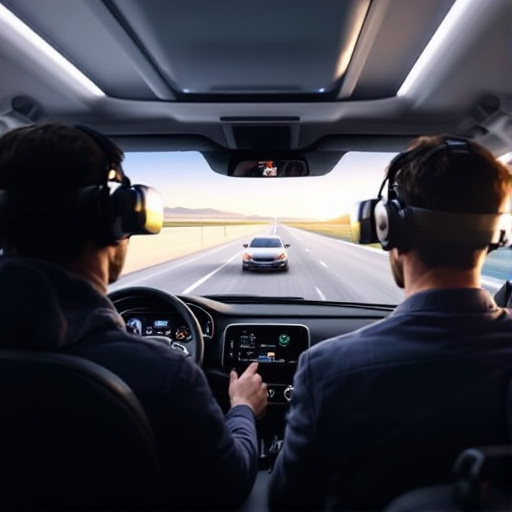Related Articles
- Unveiling the Unthinkable: How Your Social Media Posts Could Impact Your Car Insurance Premiums
- "From Showroom to Social Media: How Dealerships are Becoming Digital Storytellers in 2023"
- "From Showroom to Stream: The Rise of Virtual Reality Test Drives at Dealerships"
- Revving Up Sales: How Virtual Reality is Transforming the Dealership Experience for Shoppers and Sellers Alike
- Selling Experiences: How Dealerships Can Transform into Immersive Automotive Entertainment Hubs
- The Surprising Impact of Your Credit Card Habits on Car Financing: What You Didn't Know!
Revving Up Sustainability: How Eco-Conscious Dealerships Are Changing the Automotive Landscape
Revving Up Sustainability: How Eco-Conscious Dealerships Are Changing the Automotive Landscape
Eco-conscious car dealerships are reinventing the automotive sector by prioritizing sustainability, which is not only reshaping consumer habits but also enhancing the overall health of our planet. From innovative selling practices to embracing electric vehicles, these dealerships are setting the pace in a rapidly changing market.
Driving Change in the Automotive Industry
Imagine walking into a car dealership that smells like fresh earth rather than an oil change—sounds like a dream, right? Well, for many eco-conscious dealerships, this is a reality. They’re leading the charge toward sustainability by offering electric vehicles (EVs), providing education on green practices, and even advocating for renewable energy usage.
The Rise of Eco-Conscious Dealerships
In the past decade, the automotive landscape has dramatically shifted. In 2022, electric vehicle sales in the U.S. grew by a staggering 83% compared to the previous year, accounting for 5.6% of new car sales (source: InsideEVs). This accelerating trend is fueled not just by advances in technology but also by a growing consumer consciousness about environmental issues. These changing preferences are prompting dealerships to rethink their strategies, ensuring their practices align with the eco-friendly ideals of their customers.
Green Practices in Dealership Operations
One of the standout examples of these eco-friendly practices comes from a dealership in San Francisco, California—Kearny Mesa Volkswagen. They have taken significant steps such as implementing solar panels in their facilities and using reclaimed water for landscaping. These initiatives not only reduce operational costs but significantly lower their carbon footprint.
The dealership's manager, Sarah Thompson, notes, “It's about creating a culture of sustainability—not just within our walls but extending it to our customers and community.” This kind of approach showcases transparency and commitment, making them a role model for others in the industry.
Benefits of Sustainable Dealership Practices
But what’s in it for the dealerships? The benefits of sustainable practices go beyond mere compliance. A recent study by the National Automobile Dealers Association highlighted that eco-friendly dealerships experience 12% higher customer retention rates than traditional dealers. This can lead to increased sales and brand loyalty, proving that sustainability isn’t just a feel-good initiative—it's good for business.
Electric Vehicles: The Modern Marvel
Adopting and promoting electric vehicles (EVs) is a central component of eco-conscious dealerships. Let’s break it down: EVs produce zero tailpipe emissions, and according to the U.S. Department of Energy, over the lifecycle of a vehicle, they create 50% less greenhouse gas than gasoline-powered vehicles. If you’re still skeptical, consider this: the Tesla Model 3 recently topped the sales charts in the U.S., even outselling many traditional gas vehicles. It’s not just about saving the planet; it’s about catering to a new generation that values sustainability.
Case Study: The Green Dealership Movement
Across the nation, dealerships like Green Car Time in Austin, Texas, are setting remarkable standards. They’ve committed to reducing their emissions by 100% by 2030 by using electric cars in their delivery fleet and implementing zero-waste policies within their operations. The owner, Marcus Lee, is enthusiastic about the shift, stating, “Selling cars is great, but selling cars that don’t harm the planet is even better. Plus, people appreciate the effort!”
Engaging Customers Through Education
Education is a vital piece of the puzzle. Eco-conscious dealerships aren’t just selling cars; they’re teaching customers about sustainability. For example, many dealerships host workshops that educate buyers on the benefits of electric vehicles, charging stations, and how to maximize the efficiency of their new eco-friendly cars. These events are crucial in demystifying complex information and inspiring potential buyers to consider their future purchase through a sustainable lens.
Financial Incentives and Rebates
Additionally, many states are now offering financial incentives for the purchase of electric vehicles. In California, buyers can receive rebates up to $2,000, and federal tax credits can go as high as $7,500 (source: U.S. EPA). Are the savings too good to pass up? We think so! This integration of education and incentives makes it easier for consumers to embrace an eco-friendly lifestyle.
Challenges Ahead
Still, it’s not all sunshine and rainbows. Sustainable dealerships face significant challenges, from the fluctuating prices of electric vehicles to the need for improved charging infrastructure. As of 2023, only about 25% of Americans have access to a public charging station (source: American Public Transportation Association). This limited infrastructure can make convincing consumers to switch feel like an uphill battle.
Dealerships must advocate for better policies and infrastructure improvements to overcome these hurdles. It’s not just about selling cars; it’s about fostering an ecosystem where electric vehicles can thrive and consumers feel comfortable making the switch.
Transitioning Consumers’ Mindsets
Another interesting aspect is the shift in consumer mindset toward eco-friendly practices. Younger consumers, particularly Gen Z and Millennials, prioritize sustainability highly. Studies show that approximately 80% of consumers consider the environmental impact of their purchases (source: Nielsen). For many, the choice to buy an eco-friendly vehicle is about more than just saving money; it’s about aligning with their values. Dealerships tapping into this sentiment have a rich market of potential buyers.
Stories of Successful Transitions
Let’s take a step back and consider Janice, a 24-year-old freelance graphic designer who recently purchased an EV from an eco-conscious dealership in Portland, Oregon. “I never thought I’d buy a car, let alone an electric one,” she says. “But the knowledge and support from the dealership made it an easy choice. It felt like a step toward making a positive impact.” Janice’s story is just one among many that highlight the naiveté of consumers transforming their perceptions of the automobile industry.
The Future of the Automotive Landscape
As we shift into a more environmentally aware future, the automotive industry must adapt. Dealerships leading the way in sustainability are not just chasing trends—they are playing a crucial role in combating climate change. By promoting electric vehicles, implementing green practices, and educating consumers, these dealerships are setting a precedent that could redefine the industry for generations.
Call to Action: Join the Movement
So, what’s stopping you from joining this movement? The next time you’re in the market for a car, consider visiting one of these eco-conscious dealerships. Engage in conversations, ask questions, and take part in events. Every small step counts, and together, we can drive change in the automotive landscape. Your future ride—and the planet—will thank you!
Conclusion: A Sustainable Drive Forward
In conclusion, as the automotive landscape evolves, eco-conscious dealerships emerge not just as sales points but as educational hubs and advocates for sustainable driving. They serve as a reminder that combining business with environmental responsibility is the new frontier of success. The road ahead is green, and it’s time we all rev up for sustainability!





